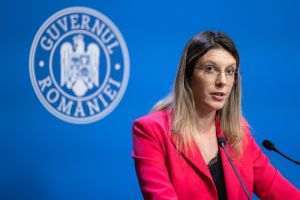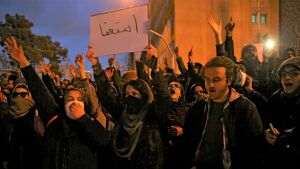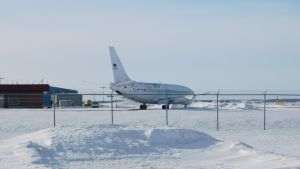
The national team won the last match played at the National Arena, even though it had two opponents: Kosovo and the group of fans known as "Uniţi sub Tricolor" (United under the Tricolor). The match consisted of three halves of 45 minutes each, with two played against the Kosovo team and one against a section of the fans in one of the stands. In terms of football, the team prevailed due to their persistence against a spirited opponent with individual talents but incapable of forming a cohesive team. In the "geopolitical" aspect of the match, the Romanian team had few chances, and the intervention of the gendarmerie was necessary to prevent the match from being forfeited due to off-field issues.
In brief, the history of this match is as follows: Romania won the Euro 2024 qualification match against Kosovo with a score of 2-0 at the National Arena. Nicolae Stanciu scored in the 83rd minute, and Valentin Mihăilă increased the score in the 90+3rd minute. The match was interrupted in the 18th minute due to banners, flares, and chants and resumed after 45 minutes. The message "Kosovo e Serbia" (Kosovo is Serbia) inflamed tensions and led to the Kosovo players leaving the field with the approval of the referee, Willy Delajod. The group that displays the message "Basarabia e România" (Bessarabia is Romania) seems to have conflicts at every match, unrelated to the on-field competition. In Andorra, fans from this group fought among themselves, lit flares, and chanted against Hungarians; in Switzerland, they lit flares and chanted against imaginary enemies; at the National Arena during the match against Israel, they displayed Palestinian flags and clashed with security personnel, to mention just a few incidents from the current campaign. It is increasingly evident that this group is primarily interested in using international matches to parade a form of nationalism from a different era.
Despite strong positions against this group, there are voices that support their actions, considering it an extension of Romania's foreign policy, which does not recognize the state of Kosovo. Following this logic, what should Ukraine's fans do in a possible future match against Russia? Without separating from politics, sports would be condemned to become a mere propaganda tool, a highly dangerous weapon in the hands of politicians in pursuit of power. Furthermore, it has become a tradition for football fan groups to appear at various street demonstrations in our country and provoke incidents that serve a certain part of the political class.
In this case, as they have accustomed us, the authorities intervened late, despite warnings about what was going to happen. Before the match, the group from the stands posted a clear message: "Tonight, the national team will meet the football representative of a region that Romania does not recognize as an independent state, respecting the historical truth that this territory was illegitimately detached from our neighboring country, Serbia. After our anthem was loudly booed at the first-leg match in Pristina, and Romanian supporters were subjected to constant insults and repeated jeers from Kosovo fans, with a significant number of Romanian fans being evacuated, arrested, assaulted, and fined only for stating a historical truth recognized at the state level, it's time for the return match. We remain consistent in affirming reality, just as we did in the home-and-away matches against Serbia in 2018, in Belgrade and Bucharest, as well as in the first-leg match in Pristina. We perceive today's opponent as one without legitimacy, detached through foreign interests from the mother country, just as Bessarabia was repeatedly stolen from our country by the 'monster from the East.' See you at the stadium!" Another detail not to be forgotten is that George Simion, the leader of AUR (Alliance for the Union of Romanians), is a founding member of the "Uniţi sub Tricolor" group.
The national team will likely face new sanctions from UEFA, as they have a history of incidents, and closing stadiums or suspending matches could have a significant impact on the remaining games in this group. It is clear that no team in the world needs a fan group that causes nothing but trouble because it has an agenda other than the strictly sporting one. The specter of hooliganism is haunting Europe again, especially in areas where the authority of the state appears weak. Although some messages from fan groups can appeal to our patriotic feelings, one thing should be clear: maps are not drawn, and borders are not defined in the stands of football stadiums.
The spokesperson for the National Liberal Party (PNL), Ionuţ Stroe, a former Minister of Sports, states that it is unacceptable for the national football team and millions of Romanian supporters to be held hostage by behaviors like those exhibited during the Romania-Kosovo match. He emphasizes that such disputes have no place in sports and that these individuals are doing harm to the national team. Stroe commented on the incidents on his Facebook page, saying that it's not the first time that sports, football, and competition have been hijacked in this way. He believes that these individuals are damaging the national team for their own visibility and that their actions are simply foolish.
Former national team captain Gică Popescu had a firm message, expressing his lack of understanding for the supporters' behavior. He believes that they do not understand their purpose, emphasizing that sports should be about supporting the team, not about politics. Popescu underlines that supporters should not cause harm and that political messages should stay outside the stadium. He questions the actions of the group "Uniţi sub Tricolor" (United under the Tricolor) and suggests that if they claim to be united, they should support the national team without causing harm. He emphasizes that such attitudes have no place on the football field, and political messages should remain outside the stadium. He also mentions that UEFA is very strict about such incidents and that he has never seen anything like this before.
The Romanian Football Federation (FRF) strongly condemns the irresponsible behavior of the group of spectators in the South stand that led to the interruption of the Romania-Kosovo match at the National Arena. FRF emphasizes the principle that governs football in Romania, which is the non-interference of politics in sporting events. FRF also condemns provocative political, ideological, religious, or insulting messages, stating that they are strictly prohibited in stadiums. The federation attributes these incidents to a small group of so-called supporters and acknowledges that their acts of hooliganism affected the normal course of the match and the spirits of the players. They express regret for the negative experience the majority of spectators had but also thank them for their fantastic support during the second half of the match.
--------------------
Csaba Asztalos, the President of the National Council for Combating Discrimination, reacts to the scandal at the Romania-Kosovo match, stating that geopolitical messages have no place in sports. UEFA does not permit the transmission of political messages in stadiums, and he emphasizes the importance of spectators for the national team. Playing without spectators would result in a significant financial loss and a lack of support for the national team. Asztalos expects the day when these supporters, who are captured on camera, will be taken to court and held financially accountable for their actions.
--------------------
The incidents in Bucharest did not escape international media attention. The BBC notes that Kosovo's independence is recognized by 100 countries, including the United Kingdom, but Romania is among the few EU countries that do not recognize it. Romanian supporters raised a banner that said "Basarabia este România" (Bessarabia is Romania) in the same section as the anti-Kosovo message. Bessarabia, which was part of Romania from 1918 to 1940, is divided between Moldova and parts of Ukraine. Marca, a Spanish publication, commends the response of the rest of the stadium's public against the ultras, highlighting their exemplary behavior when the ultras started chanting "Romania, Romania," and the rest of the crowd invited them to leave the stadium. AS, a Spanish newspaper, reported "Political Scandal in Romania: Kosovo Players Leave the Field." Italy's Gazzetta dello Sport covered the incident in Bucharest, stating that the ultras chanted "Kosovo e Serbia," and the referee suspended the match. Negotiations between law enforcement and the ultras led to the removal of problematic banners, and eventually, the spectators were allowed to remain in the stands, although they had been expelled on other occasions, according to Hungarian publication nemzetisport.
--------------------
The General Directorate of Gendarmerie of the Municipality of Bucharest specified that 458 people who were part of the group of supporters due to which the Romania - Kosovo match was interrupted have been identified up to this moment in order to take "legal measures against those responsible for violating the framework legally in force". So far, 3 notification documents have been established and drawn up in order to forward them to the competent bodies, in accordance with the provisions of Law no. 126/1995 regarding the regime of explosive substances. Also, 17 contraventional sanctions were applied, totaling 8,000 lei. Further, checks are being made to identify and sanction other persons who violated the legal framework in force, the Gendarmerie specified.
The Gendarmerie of the Capital also explains how it was done after the interruption of the match on Tuesday: "After the interruption of the match, following the consultation of the representatives of the Romanian Football Federation and UEFA, one of the objectives in mind was to de-tension the situation, so that the match could be resumed under conditions of safety, without endangering the other spectators and not taking the decision to cancel the sports game. Thus, the gendarmes together with the representatives of the Romanian Football Federation intervened immediately to talk with the members of this faction of supporters to make them aware of the risks associated with displaying messages that incite and can create a tense atmosphere within the sports event and the risk of losing the match at the "green table" ». We mention that, following the consultation with the representatives of UEFA and the Romanian Football Federation, it was decided by mutual agreement that the law enforcement agencies should manage this situation through dialogue, without the need to evacuate people and there being no request from the two forums in this sense. After assessing the situation and obtaining assurances from the supporters that such behavior will not occur again, the match was resumed safely, without violence". "The Bucharest Gendarmerie and the Romanian Football Federation express their hope that such incidents will not be repeated and that football will remain a means of joy and unity for all supporters", added the Gendarmerie, noting that for the development in conditions of order and safety of the match, approximately 500 gendarmes, along with the other representatives of the institutions with attributions in the field, took measures for the safe movement of supporters to and from the stadium, during the sports game within the National Arena, as well as to ensure a climate of safety at the level of the Capital.
























































